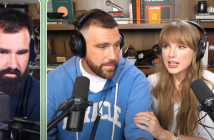 As the second-longest running cast member in the history of “Saturday Night Live,” Tim Meadows doesn’t really need to work another day in his life to feel comfortable that he’s secured a place in the hearts of TV viewers everywhere. Fortunately, however, he does keep working steadily, both in motion pictures and the small screen; he even takes the occasional detour onto a record album. Bullz-Eye had a chance to participate in an NBC teleconference with Meadows on the occasion of an upcoming “SNL” special – “Saturday Night Live in the ‘90s: Pop Culture Nation” – and we took full advantage of the opportunity, getting on the line on three separate occasions to ask questions. (We trimmed it down to just the Q&A portion of the conversation, but suffice it to say that, by that third time he heard our name announced, he immediately said, “You again?”)
As the second-longest running cast member in the history of “Saturday Night Live,” Tim Meadows doesn’t really need to work another day in his life to feel comfortable that he’s secured a place in the hearts of TV viewers everywhere. Fortunately, however, he does keep working steadily, both in motion pictures and the small screen; he even takes the occasional detour onto a record album. Bullz-Eye had a chance to participate in an NBC teleconference with Meadows on the occasion of an upcoming “SNL” special – “Saturday Night Live in the ‘90s: Pop Culture Nation” – and we took full advantage of the opportunity, getting on the line on three separate occasions to ask questions. (We trimmed it down to just the Q&A portion of the conversation, but suffice it to say that, by that third time he heard our name announced, he immediately said, “You again?”)
Bullz-Eye: Hi, Tim. Did you call Darrell Hammond and congratulate him when he took the title of “longest running “SNL” cast member” away from you?
Tim Meadows: You know, if I was a better man, I would’ve done that. But, no, I didn’t. But I am very happy for him. Not a lot of people have worked on the show that long, so even though he has taken over the record, I still feel like I’m Barry Bonds to his Hank Aaron. I’m still in good company.
BE: Who were some of your favorite impressions that you did on the show, and did you ever get feedback – either favorable or otherwise – from anyone you impersonated?
TM: Uh, well, thank God I didn’t ever hear back from O.J., which I was very happy about. Bernard Shaw from CNN sent us a letter; he wasn’t too happy with my portrayal of him, but that didn’t really bother me that much, because I wasn’t really a big fan of his, anyway.
BE: You actually resurrected your most famous “SNL” character, The Ladies’ Man, for Handsome Boy Modeling School’s White People album. How did you get involved with that project?
TM: Um, actually, Prince Paul is friends with Chris Rock, and Chris Rock called me and said that Prince Paul was wondering if I could do something on that album, and he said that he was a big fan of The Ladies’ Man. So he just basically had these scenarios, and I just came in and improvised a bunch of stuff, and it turned out to be a lot of fun. It didn’t pay a lot, but it was cool to be on the record album.
BE: Did you get a lot of good feedback from it?
TM: Yeah! It’s cool, because it’s such a different audience from “SNL.” It’s more of a hip-hop/dance crowd. And, actually, this guy came up to me just yesterday and said that he’d been listening to Handsome Boy Modeling School.
BE: As far as the worst “SNL” hosts, is the rumor true about how bad Steven Seagal was as a host?
TM: Well, you know, I’m not going to… (laughs) That’s a tough question, because he still is a martial arts expert, and I live in L.A., so I don’t want him coming looking for me! But it wasn’t a fun week that week, and…y’know, it was… (hesitates) It’s hard for someone with almost no sense of humor to host “SNL.” (laughs) I think that’s the best way to put it. Even with, like, athletes, who you don’t expect to be funny, they come in and they just do the show and they do what you ask them to do. They’re coachable. They want to learn new things, and it turns out to be a fun week whenever we’ve had sports. But that week in particular, it was difficult. Because he had his ideas about what was funny, and you just wanted to go, “Well, what have you done that’s funny that I should actually trust what you think?” You know? And, so, yeah, I’m not gonna say he was the worst host, but…it wasn’t a fun week. It was one of those weeks that I’d rather forget about.
BE: I know things get cut for a reason, but were there ever any sketches that got cut in dress that you always wished had made it on the air?
TM: Uh, yeah, I mean, there was this one sketch that I loved that never made it to air, and it was called “Leon the Cool Centaur.” And it was me in a centaur costume, and I was, like, in high school, and I was, like, the tough guy who was half man and half horse. And sort of the joke of the sketch was that the horse end kept making droppings on the floor of the school. (chuckles) So it was more of a conceptual sketch. And we did it twice, and it always got laughs, but, I don’t know, I think maybe it was just too out there for our show. I don’t know.
BE: I know it didn’t set any box office records, but were you happy with the “Ladies Man” movie?
TM: Uh, it did set box office records… (starts to laugh) …for Most Mediocre Box Office. Um, was I happy with it? Yeah, you know, there were things about it that I wish I could’ve changed, that were sort of out of my hands, even though I asked for it. But I asked for some things to be cut or changed or re-edited, but it was my first movie, so I didn’t have the power to say, “Get it done.” But all in all, yeah, I was happy with it. Like I said, it did okay at the box office or whatever, but I can honestly say that there’s not a day that goes by where somebody doesn’t come up and tell me how much they love that movie or love that character. I mean, every day. It happens every day.
BE: And, lastly, when Eddie Murphy first started on “SNL,” he did a sketch about how he was replacing Garrett Morris as the show’s resident “black guy.” Did you ever feel that you were perceived that way? I mean, I know that when you actually started, you were on the show with Chris Rock, so you weren’t the only black cast member at the time, but…
TM: No. I mean, you know, I was aware that other people perceived it that way, but I didn’t. I didn’t see myself as the black guy who was replacing Eddie or Chris or anybody else. I just was…when I got there, I was in awe. I couldn’t even believe I was working on the show. And, so, I realized that part of being African-American is that I’m gonna represent things that affect my life or things that I find funny. But in addition to that, I’m also going to try to do things that have nothing to do with being black or a black character, and I’m going to try to write sketches that are just conceptual or just funny to me. And, y’know, I always felt that I was more than just a black comic actor. I mean, my first year there, I was a writer and performer, and I wrote sketches that I didn’t appear in that had nothing to do with being African-American. They were just sketches that were funny and stood on their own.
BE: Thanks a lot.
TM: Sure.


